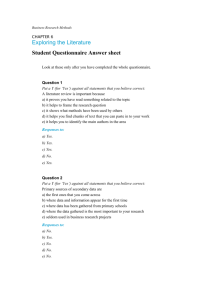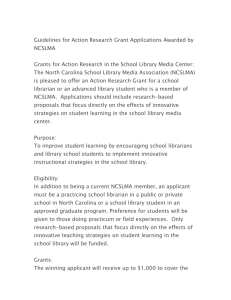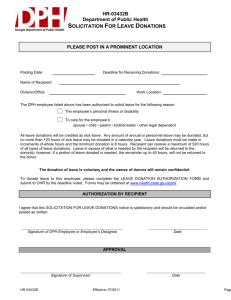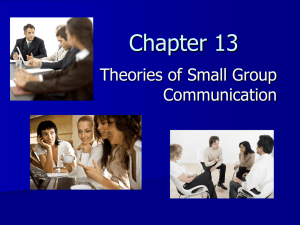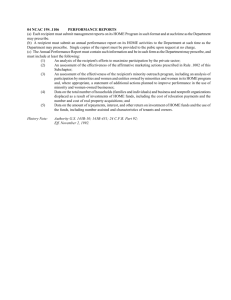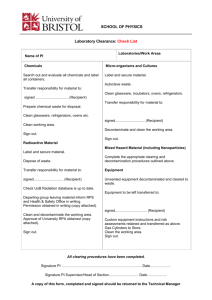MECOMED Code of Business Practice
advertisement
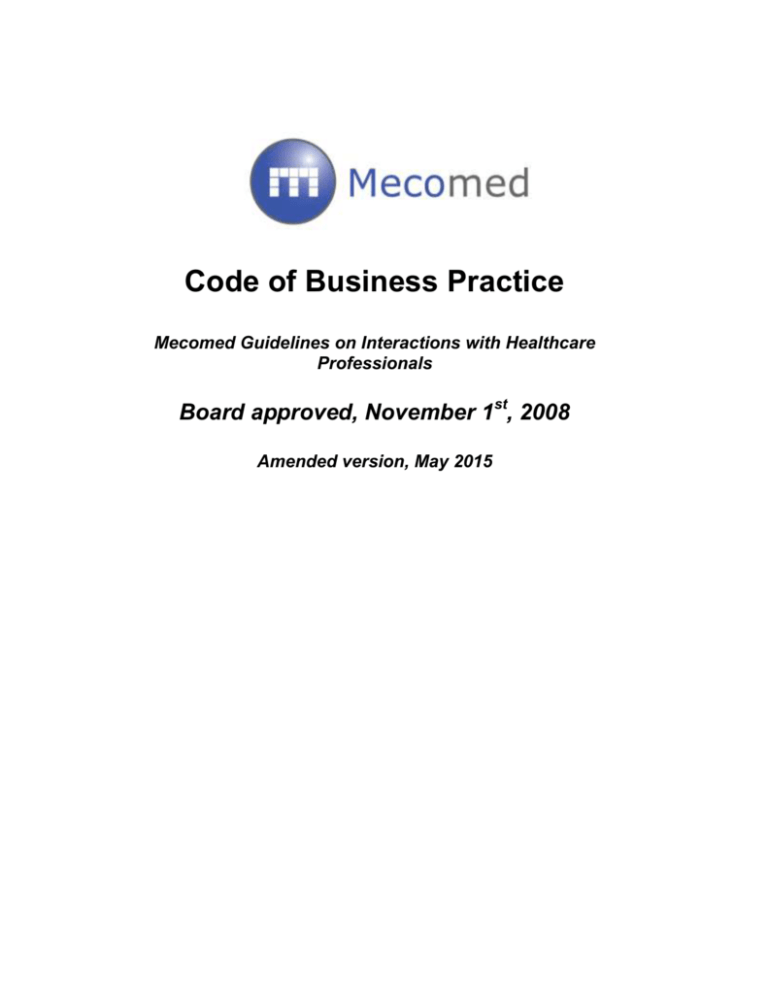
Code of Business Practice Mecomed Guidelines on Interactions with Healthcare Professionals Board approved, November 1st, 2008 Amended version, May 2015 The MECOMED Code of Business Practice consists of the Guidelines on Interactions with Healthcare Professionals and the Guidelines on Competition Law. This brochure contains only the Guidelines on Interactions with Healthcare Professionals. All documents including the Guidelines on Competition Law and the Q&A on the MECOMED Guidelines on Interactions with Healthcare Professionals are available in the separate Q&A appendix I. Preamble These guidelines are intended to provide guidance on the interactions of MECOMED members with individuals (clinical or non-clinical, including but not limited to, physicians, nurses, technicians and research coordinators) or entities (such as hospitals or group purchasing bodies) that directly or indirectly purchase, lease, recommend, use, arrange for the purchase or lease of, or prescribe members’ medical devices (“Health Care Professionals”). There are many forms of interactions between MECOMED members and healthcare professionals that advance medical science or improve patient care, including: • Advancement of medical technology: The development of innovative medical devices and the improvement of existing products require collaboration between members and Health Care Professionals. Innovation and creativity are essential to the development and evolution of medical devices, often occurring outside the facilities of medical device companies. • Safe and Effective use of Medical Technology: The safe and effective use of medical technology requires members to offer Health Care Professionals appropriate instruction, education, training, service and technical support. Regulators may also require this type of training as a condition of product approval. • Research and Education: Members’ support of bona fide medical research, education, and enhancement of professional skills contribute amongst others to patient safety and increase access to new technology. MECOMED members recognize that adherence to ethical standards and compliance with applicable laws is critical to the medical technology/devices industry’s ability to continue its collaboration with Health Care Professionals. Members must encourage ethical business practices and socially responsible industry conduct related to their interactions with Health Care Professionals. Members must continue to respect the obligation of Health Care Professionals to make independent decisions regarding treatment. The guidelines are based on the following key principles: • The Principle of Separation: Interaction between industry and Health Care Professionals must not be misused to influence through undue or improper advantages, purchasing decisions, nor should such interaction be contingent upon sales transactions or use or recommendation of members’ products. • The Principle of Transparency: Interaction between industry and Health Care Professionals must be transparent and comply with national and local laws, regulations or professional codes of conduct. In countries where specific provision is not made, members shall nevertheless maintain appropriate transparency by requiring before written notification is made to the hospital administration, the Health Care Professional’s superior or other locally-designated competent authority, fully disclosing the purpose and scope of the interaction. • The Principle of Equivalence: Where Health Care Professionals are engaged by a member to perform a service for or on behalf of a member, the remuneration paid by the member must be commensurate with, and represent a fair market value for, the services performed by the Health Care Professional. • The Principle of Documentation: For interactions between a member and a Health Care Professional, such as where services are performed by a Health Care Professional for or on behalf of a member, there must be a written agreement setting out, inter alia, the purpose of the interaction, the services to be performed, the method for reimbursement of expenses as well as the remuneration to be paid by the member. The activities envisaged by the agreement must be substantiated and evidenced by activity reports and the like. Adequate documentation such as the agreement, related reports, invoices etc. must be retained by the member to support the need for, and materiality of, the services as well as the reasonableness of the remuneration paid. Members should require that third party intermediaries, both sales intermediaries and other third party agents, including but not limited to, consultants, distributors, sales agents, marketing agents, brokers, commissioner commercial agents and independent sales representatives, who interact with Health Care Professionals in connection with the sale, promotion or any other activity involving members’ products, comply with standards equivalent to these guidelines. Accordingly, it is recommended that where such arrangements are entered into, the relevant contractual documentation imposes obligations upon the third party to comply with these or with equivalent guidelines. These guidelines set out the standards appropriate to various types of relationships with Health Care Professionals. These guidelines are not intended to supplant or supersede national laws or regulations or professional codes (including company codes) that may impose more stringent requirements upon members or Health Care Professionals who engage in certain activities in those countries. All members should independently ascertain that their interactions with Health Care Professionals comply with all current national and local laws, regulations and professional codes. II. Member-Sponsored Product Training and Education Where appropriate, members should make product education and training available to Health Care Professionals to facilitate the safe and effective use of medical technology. Such education and training programs should occur at appropriate locations taking account of the convenience of the attendees and the nature of the training. In particular: Programs and events should be conducted in clinical, laboratory, educational, conference, or other appropriate settings, including members’ own premises or commercially available meeting facilities, that are conducive to an effective transmission of knowledge and any required “hands on” training. The training staff should have the appropriate expertise to conduct such training. Members may provide attendees with reasonably priced meals in connection with the programe, and for educational programs necessitating overnight stays, additional hospitality may be appropriate. Any hospitality should be reasonable in value, subordinate in time and focus to the educational purpose of the training and in compliance with the regulations of the country where the Health Care Professional is licensed to practice. Members may pay for reasonable travel and accommodation costs incurred by an attending Health Care Professional, in compliance with the regulations of the country where the Health Care Professional is licensed to practice. Members are not permitted to facilitate or pay for meals, travel, accommodation or other expenses for spouses or guests of Health Care Professionals, or for any other person who does not have a bona fide professional interest in the information being shared at the meeting. III. Supporting Third Party Educational Conferences Bona fide independent, educational, scientific or policy-making conferences promote scientific knowledge, medical advancement and assist in the delivery of effective health care. To these ends members may support such events provided the educational conference content promotes scientific knowledge, medical advancement and the delivery of effective health care and is consistent with relevant guidelines established by professional societies or organizations for such meetings. MECOMED members may support such events by the provision of financial, scientific, technical, organizational and/or logistical assistance as follows: • Health Care Professional Sponsorship. Where permitted under national and local laws, regulations and professional codes of conduct, members may provide financial support to cover the cost of conference attendance by individual Health Care Professionals. Such financial support should be limited to the conference registration fee and reasonable travel, meals and accommodation costs relating to attendance at the event. Members must ensure full compliance with national and local laws with regard to the disclosure or approval requirements associated with such sponsorship and where no such requirements are prescribed, nevertheless they shall maintain appropriate transparency, for example, by requiring prior written notification of the sponsorship is made to the hospital administration, the Health Care Professional’s superior or other locally-designated competent authority. • Advertisements and Demonstrations. Members may purchase advertisements and lease booth space for company displays at conferences. • Conference Support. Members may provide financial grants directly to the conference organizer to reduce the overall cost of attendance for participants and to cover reasonable honoraria, travel, meals and accommodation expenses of Health Care Professionals who are bona fide conference faculty members. A written request must be made by the conference organizer to the member, and any sponsorship must be paid directly to the conference organizer or training institution. The conference organizer alone is responsible for the program content and the faculty selection. Members may not have any detailed involvement in determining the content of the conference other than recommending speakers or commenting on the program where requested to do so. • Satellite Symposia. Members may sponsor satellite symposia at third party conferences and provide presentations on subjects that are consistent with the overall content of the third party conference provided that all information presented is fair, balanced and scientifically rigorous. Members may determine the content of these events and be responsible for faculty selection. The arrangement must be documented by written contract and the support of the member must be disclosed in all materials relating to the satellite event. • Scholarships. Members may also provide educational grants to training institutions, health care institutions or professional societies for medical education programs by providing financial support for fellowships and similar scholarship awards. The selection of the grantee should be within the discretion of the institution at which they are enrolled, or the teaching institution at which they will be trained. Grants must be provided to the teaching or professional institution not to individual fellows, save at the prior written request of the institution. In no way should the funding be tied to an institution’s purchase of a company’s products, or otherwise be based on an institution’s past or potential future use of the company’s products or services. IV. Sales and Promotional Meetings In the countries where it is appropriate for members to meet with Health Care Professionals to discuss product features, conduct contract negotiations, or discuss sales terms, these meetings should, as a general rule, occur at or close to the Health Care Professional’s place of business. In connection with such meetings, members may pay for reasonably priced meals for Health Care Professional attendees in an environment that is conducive to the exchange of information. Where plant tours or demonstrations of non-portable equipment are necessary, members may also pay for the reasonable travel and accommodation costs of Health Care Professional attendees. However, members are not permitted to facilitate or pay for meals, travel, accommodation or other expenses for spouses or guests of Health Care Professionals, or for any other person who does not have a bona fide professional interest in the information being shared at the meeting. V. Arrangements with Consultants Health Care Professionals may serve as consultants to members, providing meaningful bona fide services, including research, participation on advisory boards, presentation at membersponsored training or third party educational conferences, and product development. It is appropriate to pay Health Care Professionals reasonable compensation for performing these services. The following factors support the existence of a bona fide consulting arrangement between members and Health Care Professionals: • Consulting agreements must be entered into only where a legitimate purpose for the services is identified in advance. • Selection of consultants must be on the basis of the consultant’s qualifications and expertise to address the identified purpose and should not be on the basis of volume or value of business generated by the consultant. • Consulting arrangements with Health Care Professionals must be described in a written agreement, signed by the parties and must specify the services to be provided. Such arrangements must be consistent with the regulations of the country where the Health Care Professional is licensed to practice. • The compensation paid to Health Care Professionals engaged as consultants must be the fair market value for the services provided and must not be tied in any way to the value of medical devices, which the consultants may use for their own practice. All payments made must comply with applicable tax and other legal requirements. Members may pay for reasonable and actual expenses incurred by consultants in carrying out the subject of the engagement including reasonable and actual travel, meals and accommodation expenses incurred by consultants in attending meetings with, or on behalf of members. The written agreement should describe all expenses that can be claimed by the consultant in relation to the provision of the services. • Members must ensure full compliance with national and local laws with regard to the disclosure or approval requirements associated with members engaging Health Care Professionals as consultants. Where no such national requirements are prescribed, members shall nevertheless maintain appropriate transparency by requiring before written notification is made to the hospital administration, the Health Care Professional’s superior or other locally-designated competent authority, disclosing the purpose and scope of the consultancy arrangement. • All consultancy arrangements with Health Care Professionals must be documented in writing even if the Health Care Professional does not require payment for services or if the arrangement involves a one-day event only. • The venue and circumstances for member meetings with consultants should be appropriate to the subject matter of the consultation. The meetings should be conducted in clinical, educational, conference or other suitable settings, including hotels or other available meeting facilities, conducive to the effective exchange of information. • Member-sponsored hospitality that occurs in conjunction with a consultant meeting should be modest in value and should be subordinate in time and focus for the primary purpose of the meeting. • When a member contracts with a Health Care Professional acting as a consultant for research services, the written agreement described above must reference a written research protocol or written schedule of work as appropriate and all required consents and approvals should be obtained. • When a member contracts with a Health Care Professional for the development of intellectual property, there must be a written agreement providing compensation at a fair market value. However, under no circumstances may the Health Care Professional receive any financial compensation in respect of medical devices he/she has prescribed in the past or may prescribe in the future, including medical devices, which contain the novel intellectual property. All required consents and approvals should be obtained, including from the hospital administration or the Health Care Professional’s superior (or locally-designated competent authority). VI. Gifts Members occasionally may provide inexpensive, branded or non-branded items as gifts to Health Care Professionals, if they are modest in value and in accordance with the national and local laws, regulations and industry and professional codes of conduct of the country where the Health Care Professional is licensed to practice. Gifts must relate to the Health Care Professional’s practice, benefit patients or serve a genuine educational function. Gifts must not be given in the form of cash or cash equivalents. This section is not intended to address the legitimate practice of providing appropriate sample products and opportunities for product evaluation. VII. Provision of reimbursement and other economic information Members should support accurate and responsible billing to reimbursement authorities and other payers. In doing so they provide economic efficiency and reimbursement information to Health Care Professionals, and third party payers regarding members’ products. This information should be limited to identifying appropriate coverage, coding or billing of member products, or procedures using those products, or to encouraging the economically efficient delivery of member products. This section is not intended to address the legitimate practice of providing technical or other support intended to aid appropriate use or installation of the member’s products VIII. Donations Purposes for Charitable and Philanthropic Members may make donations for charitable or other philanthropic purposes. Donations may be made only to charitable organizations or other non-profit entities entitled to receive them under applicable national or local laws and regulations. Donations may be made to support the general activities of a bona fide organization or may be made to support general fund raising drives for projects undertaken by such an organization. Charitable donations must not be tied in any way to past, present or potential future use of the member’s products or services. All donations to a charity or non-profit organization should be appropriately documented. For example, a written request should be submitted by the charitable organization, detailing the purpose of the charity and the nature of its activities. The payment should be made out in the name of the charity and paid directly to the charity. Charitable donations to a bona fide organization should not be made in response to requests made by Health Care Professionals unless the Health Care Professional is an employee or officer of the organization and submits the request on behalf of the organization. It would not be appropriate for a member to support the favorite charity of a Health Care Professional in response to a request by that Health Care Professional. Members should have no control over the final use of funds provided as charitable donations to charitable and other non-profit organizations. IX. Educational Grants Members may provide funds to support genuine independent medical research, advancement of medical science or education, or patient and public education. However, it is important that support of these programs and activities by members is not viewed as a price concession, reward to favored customers or inducements to recommend, prescribe or purchase members’ products or services. Therefore members should ensure that they maintain appropriate documentation in respect of all educational grants made. Educational grants must not be tied in any way to past, present or potential future use of the member’s products or services. Educational grants may be made only to organizations or entities entitled to receive them under applicable national and local laws and regulations and should not be made to individual Health Care Professionals. (For guidance on how members may support the education of individual Health Care Professionals refer to Section III Supporting Third Party Educational Conferences). Examples of appropriate educational programs and related considerations are as follows: • Scholarships. Professional organizations, hospitals and universities where Health Care Professionals are in training may be eligible to receive grants to support scholarships. For guidance on how members may support scholarships and similar awards refer to Section III Supporting Third Party Educational Conferences. • Advancement of Healthcare Education. Members may support Health Care Professional education by donating funds to institutions or organizations for either accredited or non-accredited health care education. For further guidance on how members may support such education, refer to Section III Supporting Third Party Educational Conferences. • Research. Research grants to support customer-initiated studies may be permitted for programs involving clinical or non-clinical research in areas of legitimate interest to the member. The member may provide funds for documented expenses, in-kind services, or free product to support clearly defined bona fide research activities of Health Care Professionals where permitted by national and laws, regulations and professional codes of conduct. All requests for research grants must be in writing from the requestor stating the nature and objective of the research activity. No support should be provided until a written agreement is signed by both parties and said agreement should provide for adverse event reporting where appropriate. Full disclosure of the award must be made to the hospital administration, or the Health Care Professional’s superior or other locally designated competent authority as appropriate and the recipient of the grant shall be required to acknowledge the member’s support of the research in all oral or written presentations of the results. • Public Education. Members may make grants for the purpose of supporting education of patients or the public about important health care topics. Addendum I Exceptions to the code Exception No.1 MECOMED acknowledges that female HCPs from the region may be required locally to be accompanied by their spouse, a male family member, or other eligible person when traveling to attend member-sponsored trainings and/or 3rd party events. MECOMED agrees to facilitate the travel logistics of the spouse or the male family member if required; however, it is clear that any costs incurred by the spouse and/or accompanying person, as defined above, are to be borne by the HCP herself. Addendum II Fair Market Values and acceptable limits Interaction Type Limits Meals Modest and reasonable in the area where the activity takes place Hotel Business city hotel: The hotel should not be the main attraction of the event; the hotel should not have a resort, beach, golf, casino, etc. Educational items and/or items of benefit for the patient provided they are of modest and reasonable value. Gift Text books or medical journal subscriptions: 500$ / HCP / Year Internal stricter rules of companies apply. Travel - Economy for < 5 hours - Business for > 5 hours If HCP has any health problem that doesn’t enable him/her to travel on economy class in flights below 5 hours, local HCCO should assess the need to provide an exception for HCP to travel on business class. Local HCCO should document reason for granting exception. No further exceptions would be granted at company level. Internal stricter rules of companies apply Comments Restaurant should be conducive to a business discussion Cultural gifts are not allowed Gifts or flowers for major life events (birth, promotion, wedding, etc…) are not allowed. Addendum III Congress Vetting System (CVS) Constitution: The MECOMED Congress Vetting System (CVS) was implemented as a pilot after the board approval in November 2013 and became fully implemented in April 2014. It is set up in order to evaluate the compliance of Third Party Conferences with the MECOMED Code of Business Practice. The CVS Committee is comprised of 3 members elected by the MECOMED Board out of the Compliance Steering Group plus one admin Headcount, nominated by the Compliance Committee. Geographic scope: The CVS shall cover events being held in the geographic scope of MECOMED: Morocco, Tunisia, Algeria, Libya, Egypt, Kingdom of Bahrain, Kuwait, Qatar, Sultanate of Oman, Kingdom of Saudi Arabia, United Arab Emirates, Yemen, Lebanon, Syria, Jordan, Palestinian territories, Iraq, Iran & Pakistan. Technical Scope: The CVS is providing guidance to MECOMED members on the appropriateness of direct sponsorship of Healthcare Professionals to Third Party congresses according to section III. Above. Vetting Process: Members are requested to submit doubtful events/congresses for review to the chair of the Compliance Steering Group or General Secretary of MECOMED one month before the event date to allow enough time for proper review by committee and to communicate with event organizer. The CVS Committee is reviewing the elements of the request and vote for the appropriateness of the event. Decision will be taken based on the review of the following components: Geographical location Conference venue Hotel accommodation Scientific program Social program Communication (website, brochures etc.) Decision is taken by the CVS Committee by voting of the 3 committee members. The CVS Committee requests the event organizer in case of non-compliant findings to change the congress set-up in a way to be compliant and advise those stakeholders that they have 10 calendar days prior to the publication of the final assessment decision to correct those deficiencies. If no reaction is made by the stakeholders during the 10 days, the final decision of the CVS Committee is published on the MECOMED Website. Final vetting decision is also communicated to members per e-mail. Addendum IV Third Party Intermediaries Compliance & Due Diligence) As a member of MECOMED members are requested to have appropriate effective and efficient Compliance Program covering member’s business partners, i.e. intermediaries, distributors, suppliers, etc. The selection and hiring of the business partners should be made based on the result of a risk-based due diligence process. Due Diligence Minimum Requirements: The minimum requirements of such Due Diligence process should typically contain a review of the following: Years of Experience Proof of Status (TL/ CR/etc.) Owners & Shareholders names as per passport copies and legal documents (ID’s, CV’s of key personnel) Ties with GO’s & HCP’s Screening against public database Recommended Requirements Organization Chart Owner’s ID (e.g. passport copy) Company Profile Historical information regarding good conduct and references Site visit by the company representative. During the Site Visit MECOMED members should conduct interviews with key personnel and carefully review the warehousing facilities. The premises of the Third Parties intermediaries should be in a representable condition and equipped in a way that allows conducting business in an orderly manner. Screening: In order to get a level of confidence in the business ethics of the potential business partner the following issues should also been taken into consideration: Transparency index for the relevant country Obtain Outside References report Media/Reputation Check Sanctions/Scandals Check Investigations or Litigations Training: Communicate basic integrity principles with your Business Partner. MECOMED Members should conduct Compliance Training for all Third Party Intermediaries within 6 months from appointment and frequently do refresher trainings. Contractual Obligations: Acknowledgement & consent from business partner to members Compliance program. Contractual protections in third party agreements & general T&Cs. Amending existing agreements with code of Conduct reference. Basic steps for all business partners: Measures should take into account the results of your risk assessment. Enhanced due diligence, which is also in several levels, e.g. Third party questionnaires, verification against watch lists Basic, medium and high diligence reports Third party diligence process should be auditable Due Diligence Renewal: Members should monitor all interactions with their business partners and should maintain a due diligence renewal more often as circumstances change – Each member company to set the frequency of due diligence renewal based on risk assessment bases. Addendum V MECOMED Internal Escalation Procedures Introduction: This escalation procedure is set to provide members with guiding information for addressing certain incidents or events that violate the MECOMED code of business practice, aiming to: 1. Create a venue for addressing violations, issues and concerns among the members freely (and anonymously if requested by the involved parties) 2. Improve communication among members in regards to addressing any issues 3. Provide necessary support to reporter as well as recipients when needed 4. Following up the escalated issues till they are resolved 5. Raising the awareness of certain issues among members 6. Sharing Best practice as deemed appropriate among members Scope This procedure is applicable to all members Effective Date: This procedures is effective once publicized on Mecomed website Definitions: Reporter: Is the Mecomed member that noticed or became aware of the violation made by another Mecomed member Recipient: Is the Mecomed member that receives the information from the reporter Escalation Committee: Is formed of the head of MECOMED Compliance Steering group in addition to two compliance officers who have completed at least 2 years in the compliance role and regularly attending the MECOMED face to face meetings. Procedures 1- Reporting of Incidents: a. Any member (The “Reporter”) can report verbally or in writing any violation to the Mecomed assigned Escalation Committee providing the following information at a minimum: i. Description of the Violation ii. Venue and date of the violation b. The Escalation Committee will contact the Compliance officer of the company who allegedly made the violation (The “Recipient”) c. The Recipient should investigate the alleged violation according to his/her company internal procedures d. The Recipient should provide a feedback to the Escalation Committee whether the issue has been substantiated or not, e. If issue has been substantiated, the Recipient should take necessary corrective and preventive actions f. If issue hasn’t been substantiated, The Recipient should inform the Reporter how the issue is seen at his/her company and why the recipient company believes that the reported allegation is invalid g. The Escalation Committee would be responsible to follow up the with both Reporter and Recipient till issue is resolved 2- Recurring incidents: In case of recurrence of the same incident, the Head of MECOMED Compliance Steering Group would have the right to reach out to the Headquarter of the Recipient Company addressing all related cases If incident still found to repeat, issue will be addressed to the local Trade Association of the Head Quarter of the Recipient Company 3- Case study: After the issue is reported closed by the Recipient, a summary of the case will be shared to the rest of MECOMED compliance steering group on anonymous bases. The reporter shouldn’t share the reported/alleged incident with any third parties without a written consent from the recipient. Summary of the reported cases to be shared annually with MECOMED executive committee on anonymous bases
